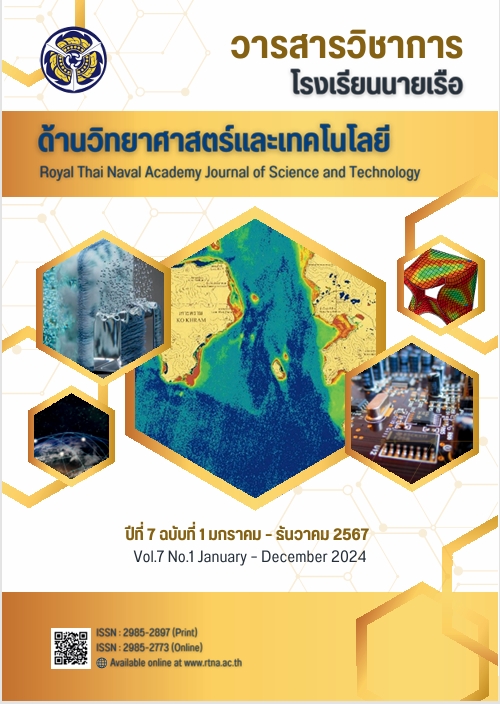การพัฒนาชุดทดลองการเคลื่อนที่แบบวงกลมโดยใช้อาดุยโน่
Main Article Content
บทคัดย่อ
งานวิจัยนี้เป็นการนำอาดุยโน่มาประยุกต์ใช้ในการพัฒนาชุดทดลองการเคลื่อนที่แบบวงกลม ซึ่งเป็นการเคลื่อนที่ตามแนวเส้นรอบวงของวงกลมรัศมีคงที่ค่าหนึ่ง โดยอาศัยความสัมพันธ์ระหว่างแรงสู่ศูนย์กลางกับความเร็วเชิงมุมของวัตถุที่เคลื่อนที่แบบวงกลมด้วยความเร็วคงที่ การวัดค่าความเร็วเชิงมุมได้ใช้เซนเซอร์
วัดความเร็วรอบร่วมกับการใช้ไมโครคอนโทรลเลอร์บนบอร์ดอาดุยโน่และแสดงผลบนจอ Liquid Crystal Display (LCD) แล้วนำมาวิเคราะห์หาค่ารัศมีวงกลม ผลการวิจัยพบว่าชุดทดลองที่พัฒนาขึ้นนี้สามารถวัดค่ารัศมีวงกลมได้ใกล้เคียงกับค่าจริง โดยมีความคลาดเคลื่อน 2.87% แสดงให้เห็นว่าชุดทดลองที่พัฒนาขึ้นนี้สามารถใช้ทดลองในการวัดค่ารัศมีวงกลมในการศึกษาเรื่องการเคลื่อนที่แบบวงกลมได้อย่างแม่นยำ
Article Details

อนุญาตภายใต้เงื่อนไข Creative Commons Attribution-NonCommercial-NoDerivatives 4.0 International License.
เนื้อหาและข้อมูลในบทความที่ลงตีพิมพ์ในวารสารวิชาการโรงเรียนนายเรือ ด้านวิทยาศาสตร์และเทคโนโลยี ถือเป็นข้อคิดเห็นและความรับผิดชอบของผู้เขียนบทความโดยตรง ซึ่งกองบรรณาธิการวารสาร ไม่จำเป็นต้องเห็นด้วย หรือร่วมรับผิดชอบใด ๆ
บทความ ข้อมูล เนื้อหา รูปภาพ ฯลฯ ที่ได้รับการตีพิมพ์ในวารสารวิชาการโรงเรียนนายเรือ ด้านวิทยาศาสตร์และเทคโนโลยี ถือเป็นลิขสิทธิ์ของโรงเรียนนายเรือ หากบุคคลหรือหน่วยงานใดต้องการนำทั้งหมดหรือส่วนหนึ่งส่วนใดไปเผยแพร่ต่อหรือเพื่อกระทำการใด ๆ จะต้องได้รับอนุญาตเป็นลายลักษณ์อักษรจากโรงเรียนนายเรือก่อนเท่านั้น
เอกสารอ้างอิง
สาขาวิชาฟิสิกส์ คณะวิทยาศาสตร์ มหาวิทยาลัยสงขลานครินทร์ [อินเตอร์เน็ต]. สงขลา: สำนักงาน; 2566. [เข้าถึงเมื่อ 20 มิถุนายน 2567] เข้าถึงได้จาก: https://www.sci.psu.ac.th/academic-programs/bachelors-degree/bachelor-of-science-physics/
สถาบันส่งเสริมการสอนวิทยาศาสตร์และเทคโนโลยี (สสวท.) [อินเตอร์เน็ต]. กรุงเทพมหานคร: สถาบันส่งเสริมการสอนวิทยาศาสตร์และเทคโนโลยี (สสวท.); 2562. สะเต็มศึกษากับกระบวนการเรียนรู้ในศตวรรษที่ 21; 2562 [ปรับปรุงเมื่อ 28 ก.พ. 2562; เข้าถึงเมื่อ 23 เมษายน 2567]; [ประมาณ 1 น.]. เข้าถึงได้จาก: https://www.scimath.org/article-stem/item/9112-21
เอกพงศ์ บัวชุม, สุระ วุฒิพรหม, ธนิดา สุจริตธรรม. การพัฒนาเครื่องมือวัดปริมาณทางฟิสิกส์ด้วยแพลตฟอร์ม Arduino วารสารวิทยาศาสตร์และวิทยาศาสตร์ศึกษา [อินเตอร์เน็ต]. ม.ค.-มิ.ย. 2563 [เข้าถึงเมื่อ 23 เมษายน 2567];3(1):98-104. เข้าถึงได้จาก: https://so04.tci-thaijo.org/index. php/JSSE/article/view/230418
ปริญญา สาเพชร. การใช้บอร์ด Arduino ร่วมกับ LabVIEW สำหรับชุดทดลองทางกลศาสตร์. Thai Journal of Physics [อินเทอร์เน็ต]. 2019 [เข้าถึงเมื่อ 23 เมษายน 2567];36(2):55-61. เข้าถึงได้ จาก: https://ph01.tci-thaijo.org/index.php/ThaiJPhys/article/view/240869
กฤษดา รวิรัศวัฒนา. การเคลื่อนที่แบบวงกลม [เอกสารประกอบการสอนรายวิชาปฏิบัติการฟิสิกส์ 2566].
วีระ บุญผุด. การพัฒนาชุดทดลองการหาค่าความเร่งเนื่องจากแรงโน้มถ่วงโลกด้วยตัวตรวจวัดเวลาแบบดิจิตอลพร้อมโปรแกรมแสดงผลอัตโนมัติด้วย loT บน Smartphone สำหรับห้องปฏิบัติการฟิสิกส์ โรงเรียนนายเรือ. วารสารวิชาการโรงเรียนนายเรือด้านวิทยาศาสตร์และเทคโนโลยี [อินเตอร์เน็ต]. ม.ค.– ธ.ค.2565 [เข้าถึงเมื่อ 23 เมษายน. 2567];5(1):158-169. เข้าถึงได้จาก: https://ph01.tci-thaijo.org/index.php/rtna/article/view/248299
ศุภกานต์ แก้วเหลี่ยม, สุคนธ์ พันธุเณร, ปราโมทย์ สุขศิริศักดิ์. ระบบควบคุมอัตโนมัติสำหรับการให้น้ำพืชผัก. วารสารวิชาการโรงเรียนนายเรือด้านวิทยาศาสตร์และเทคโนโลยี [อินเตอร์เน็ต]. ม.ค.– ธ.ค. 2566 [เข้าถึงเมื่อ 23 เม.ย. 2567];6(1):64-75. เข้าถึงได้จาก:https://ph01.tci-thaijo.org/index.php/rtna/article/view/252304
Wissarut P, Suttida R, Singha P. Young’s modulus determination for a vibrated metal ruler using Arduino. Phys Educ [Internet]. 2022 Jul;57(4): 7 pp. Available from: https://ui.adsabs.harvard.edu/abs/2022PhyEd..57d5023P/abstract
Nutchanat S, Vitchuda S. Photogate sensor for compound physical pendulum experiments. J Phys Conf Ser [Internet]. 2018 Dec;1144(1):012127. Available from:https://www.researchgate.net/publication/329723975_Photogate_sensor_for_compound_physical_pendulum_experiments


